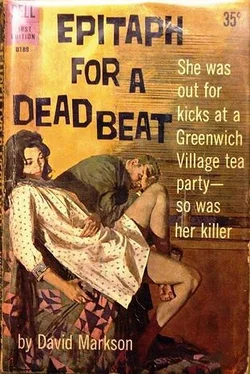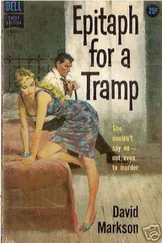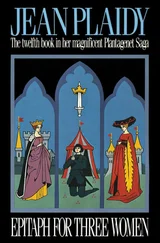The light was from an unshaded bulb over a doorway in the right-hand building. Four plank steps led down into a low room which at a glance looked wide enough to store obsolete bombers in. There was only one light inside, another naked bulb hanging from a cord socket looped over a water pipe in a far corner, and it could not have been more than forty watts. The walls of the room were whitewashed concrete, and there were no windows. There were at least fifty people standing around in clusters. A long table thrown together from sawhorses and boards stood off to the left, crowded with drink-making paraphernalia, and there was a phonograph on another table in the corner which got the light. The only other furniture seemed to be half a dozen auditorium chairs, lost in all that floor space.
“Tut’s other tomb, like,” Henshaw said. “McGruder claims he digs his doom better in the depths. He communes with the dark night of his soul.”
“He’ll commune with pneumonia if he lives here in the winter.”
Henshaw gestured toward the rear. “There’s a lone radiator out yonder. He hibernates in one room when it frosts up.”
There were doorways in the far wall, leading into what looked like a maze of corridors. The corridors were illuminated by kerosene lamps with red chimneys instead of electricity. Except for a section where heating equipment would have to be, McGruder evidently had the full basement to himself. I could think of about ten housing-authority violations his landlord could have been cited for, but I wasn’t particularly trying.
“We just help ourselves to that booze?”
“Like the butler is indisposed, you know?”
We had started over that way when a tall, narrow-shouldered man in a pink-and-white-striped polo shirt waved a limp hand in Henshaw’s direction, peered at me, then detatched himself from a group and pranced toward us. He was in his late twenties, and so thin that a June breeze would have bent him double. That lifted hand flopped around near his shoulder like a drooping epaulet all the way across. “Hiram, dear,” he twittered. He stroked about fourteen excess inches of beer-colored hair out of his gay blue eyes, not looking at Henshaw at all. “I’m so glad. I was certain you would have a previous engagement.”
“If you mean work, man, I’m applying to the sanitation department Tuesday. Meet a cat. Don McGruder, Harry Fannin.”
He didn’t curtsey, which was a small boon. The hand fluttered hither and yon some more, then finally got down to where mine was.
“Delighted, Harry. You’re new blood. I simply adore new blood.”
“Like you could save it, Don,” Henshaw grunted. “Harry goes for dames. It’s kind of a fad.”
McGruder pouted. “A shame,” he said wistfully. I got my hand back, not without a caress. “You’re more than welcome anyway, dear,” he decided. “We try our best to get along with the minority groups. Have a ball, won’t you?” He tweaked Henshaw’s ear, gave me an exaggerated wink and flitted off, as harmless as a falling leaf.
“Poets,” Henshaw said. “I forgot to clue you about that.”
I shrugged. An extremely young girl with wild black hair and a shape like an ironing board was pouring herself a Canadian Club at the makeshift bar. Most of the rest of the stuff appeared to be unadvertised house brands, so I waited for the bottle. On the floor to my right a hulking Negro in a fluorescent white shirt was slumped against the wall with a set of bongo drums between his sprawled knees and a dreamy expression on his face. A girl in a dress that might have been cut from old gunny sacks was hunkering next to him.
Just beyond them a man in a leather jacket and knee-length laced boots was fishing around in an army knapsack. The knapsack seemed to be filled with equal quantities of canned goods and paperback books.
“—You have to read the Lankavatara Sutra” someone said loudly behind me. “It’s the only way to get in—”
“—James Jones?” someone else said. “James Jones! You can’t mean it?”
Ironing Board finished with the bottle and passed it to me. You could have buried bones in the dirt under her fingernails. “Is it true?” she said. “Are they really coming tonight?”
“Who?” I said.
“Corso and Ginsberg.”
“Who are Corso and Ginsberg?”
“Who are Corso and—” She gaped at me as if I’d just heaved a rock through a cathedral window. “Why, only the two greatest poets since, since—”
“The greatest ever?”
She went off shaking her head. “—Herman Wouk?” a voice said. “Herman Woukl You don’t really—” I poured a healthy belt of the Canadian. I expected I might need it.
Henshaw was filling a tumbler with red wine from a gallon jug. “You see the Grant girl?” I asked him.
He squinted, looking around. “Her roommate.” He gestured toward the far corner. “That chick I mentioned — Dana O’Dea.”
There was only one girl over that way. She had short, coal-black hair, and she was wearing a tight shoulderless sheath dress. In better light the dress might have been the color of a burning barn, but its color didn’t matter anymore than color matters on a Rolls Royce. At sixty miles an hour its loudest noise would have been from seams stretching in the appropriate places. I could understand why a painter would make use of her. She was as voluptuous as overripe fruit.
She looked drunk. She was doing a solo shuffle to the music, rocking a pair of hips like two cruisers in a heavy sea. A man coming out of one of the corridors snatched at the back of her dress as he passed. She let out a high-pitched squeal, scampering away.
“She’s worth looking at, isn’t she?” a husky voice said next to me then. It was a voice I knew, one that sounded like fog whispering. It didn’t really sound that way. That was just a metaphor my blurry little brain had come up with in a hectic moment between all those clients in the last three days.
“Hi,” she said. She was wearing tan slacks and a powder-blue blouse which was slashed deeply between her breasts. The blouse had a high collar up under that yellow hair, and the only make-up she had on was lipstick. There was a feint touch of the same shade on a pillow slip I hadn’t gotten around to changing.
“You’re that girl whose phone must be out of order.”
“Oh, Harry, you must think I’m dreadful, but that morning, I—” She glanced past me, but Henshaw was talking to someone. No one else was at the bar. “I was going to leave you a note, Harry, but there just didn’t seem to be anything to say that wouldn’t sound banal. I’m sorry—”
“No harm done.”
“I’ve been uptown almost every minute since. About the book. It’s been a good thing, actually. It’s kept my mind off Josie.”
“Sure.”
“Although I guess I have to admit it’s also kind of exciting. It looks as if there’s going to be a movie sale, a big one.”
I was glad she was going to have a movie sale. That would make her rich and famous. She would be able to afford an answering service to take her incoming messages, like when Sam Goldwyn called. There was still a square of adhesive on her wrist.
“We’re being awfully uncommunicative,” she said.
“I haven’t meant to be, Fern.”
“You did call, didn’t you?”
“Once or twice.”
“I’ll be less busy next week, Harry.”
“Sure.”
“Please? I haven’t meant to make it seem so casual. It wasn’t— well, they weren’t the most romantic circumstances—”
“That’s true.”
“What’s true?” somebody asked. A man Henshaw’s age with a beard like a devastated wheat field had come up in back of us. He was wearing a paint-stained sweatshirt and he had strong features behind the stubble, sharper than they had appeared in Grant’s clipping. An expensive unlit briar hung inverted in one corner of his small mouth, and he took it out to kiss Fern on the cheek.
Читать дальше












